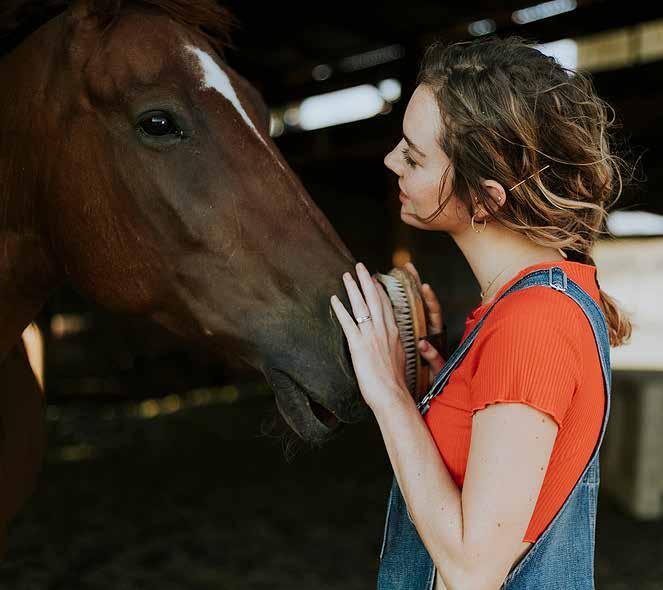
3 minute read
HORSE KEEPING
PREVENTING EQUINE GASTRIC ULCERS
Gastric ulcers are a common issue that many performance horses face, but they can also be an issue for leisure horses, broodmares, and young horses. Although gastric ulcers are common, they can often be prevented with changes to management and feeding practices.
BY JESSICA MCCOAG, MSC.
The anatomy of the equine stomach predisposes a horse without constant access to forage, to developing gastric ulcers. The stomach of the horse is a highly acidic environment and acid is produced constantly to break down food. If a horse is consuming forage throughout the day, the stomach lining is naturally protected by food and saliva. However, if a horse’s stomach is empty, it becomes vulnerable to the acidic environment, and painful lesions can occur.
Horses are designed for roaming long distances and grazing continuously; however, horses are often confined to stalls with limited turn out and fed two meals a day. Stall confinement and periods of fasting are a significant risk factor for developing ulcers. Stress of any kind including training, hauling, intense exercise, or sudden management changes all increase the risk of ulcers. High grain diets are high in non-structural carbohydrates (NSC), which can contribute to developing ulcers, particularly if fed in large amounts. Long term use of non-steriodal anti-inflammatory drugs (NSAIDs) has also been linked to developing ulcers.
Horses with gastric ulcers may show one or more of the following symptoms:
Chronic recurrent colic
Poor body condition Poor hair coat
Chronic diarrhea
Poor attitude/girthy/irritable Exercise intolerance / poor performance Poor appetite Cribbing or other stereotypic behaviours

The best way to diagnose equine gastric ulcers is by gastroscopy, with a veterinarian. In this procedure, the vet passes a tiny camera into the horse’s stomach through its nostrils to observe the stomach lining. In the case of suspected gastric ulcers, a qualified equine veterinarian should be consulted to determine the best course of action and treatment for the individual horse.

TREATMENT AND PREVENTION
Horses diagnosed with gastric ulcers require a combination of dietary, management, and pharmaceutical intervention. Working with your veterinarian to come up with a treatment plan is essential to heal ulcers and prevent recurrence. The most common treatment option is Omeprazole, which treats ulcers by temporarily suppressing stomach acid and increasing stomach pH to allow ulcers to heal. Once ulcers have healed, the use of a daily buffer or antacid product may be helpful as a preventative. Some horses may also benefit from preventative therapy before stressful events.
Horses who are prone to ulcers should have as much turnout time as possible and should be allowed to graze or have access to free choice forage. Avoid exercise on an empty stomach by offering hay 20 – 30 mins before exercise. Consider adding some alfalfa to your horse’s diet as the high calcium content of legume hay is useful as a dietary buffer. Horses without constant access to water are at a higher risk of developing ulcers, so make sure horses have access to clean, fresh water at all times. Choose a low NSC feed with highly digestible fibre sources and feed in small meals throughout the day. Some great options from Purina include Equilibrium Xcel HD, Equilibrium Trimax, the Evolution line and the Superfibra line.
The latest innovation from Canada’s leading brand in equine nutrition.
PROUDLY
CANADIAN!
TAKE HOME MESSAGE
Equine gastric ulcers are a common and serious concern for many horses. In order to prevent ulcers, it is important to reduce stress, provide lots of turnout with free choice forage, encourage hydration, and feed a low NSC feed in small meals. It is impossible to remove all risk of developing gastric ulcers from horses’ lives, but with preventative measures, the risks can be significantly reduced.
For advice on feeding a horse prone to ulcers or any other nutrition topics, contact your local Purina Equine Nutrition Consultant, or contact us via Purina Connect; we’ll be happy to answer any questions about your horse’s nutrition! www.equipurina.ca










